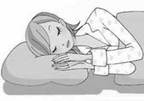题目内容
I live on the twelfth floor of a building. One afternoon I was coming home from a friend's house. It was just after four o'clock. I got quickly into the lift and pressed Button (按钮) 12.
The lift started to go up, but very slowly. And then, halfway up, it suddenly stopped between two floors. I couldn't understand it. I pressed all the buttons from 1 to 14. I called for help very loudly. But nobody answered.
Then suddenly the lights went out, and I was alone in the dark. I started to cry and beat the walls of the lift. I cried and cried until I had no voice left. Then, I felt hopeless, and pressed all the buttons with my open hands. And all at the same time, there was a bell far away. It rang and rang. It was the fire alarm (火灾警报). I thought the whole building was on fire. I said to God quietly, "Just get me out of here. I'll never be bad again."
Just then, I realized the lift was moving very slowly. On the ground floor it stopped, and the doors opened. A man was standing there. "How long have you been in the lift? It is good that you pressed the alarm bell. But haven't you learned to read at your school?" He pointed at a small piece of paper on the wall beside the lift. It said:
"Attention: This lift will be stopped for repairs between 4pm and 5 pm on Thursday March 13."
小题1:What happened to the lift?
小题2:As the situation went on, the writer became _________.
小题3:Why did a bell ring from far away?
小题4:Who most probably made the lift move again and go down to the ground floor?
小题5:After reading the paper, the writer realized that he/she had _________.
The lift started to go up, but very slowly. And then, halfway up, it suddenly stopped between two floors. I couldn't understand it. I pressed all the buttons from 1 to 14. I called for help very loudly. But nobody answered.
Then suddenly the lights went out, and I was alone in the dark. I started to cry and beat the walls of the lift. I cried and cried until I had no voice left. Then, I felt hopeless, and pressed all the buttons with my open hands. And all at the same time, there was a bell far away. It rang and rang. It was the fire alarm (火灾警报). I thought the whole building was on fire. I said to God quietly, "Just get me out of here. I'll never be bad again."
Just then, I realized the lift was moving very slowly. On the ground floor it stopped, and the doors opened. A man was standing there. "How long have you been in the lift? It is good that you pressed the alarm bell. But haven't you learned to read at your school?" He pointed at a small piece of paper on the wall beside the lift. It said:
"Attention: This lift will be stopped for repairs between 4pm and 5 pm on Thursday March 13."
小题1:What happened to the lift?
| A.It had a fire accident. |
| B.It stopped halfway. |
| C.It was turned off by the writer. |
| D.It moved fast up to the top floor |
| A.more and more scared | B.calmer and calmer |
| C.more and more bored | D.clearer and clearer |
| A.The lift was to start again. |
| B.The repair worker rang the fire alarm. |
| C.The building was on fire. |
| D.The writer pressed the fire alarm bell. |
| A.The writer. | B.The writer's friend. |
| C.The man. | D.The writer's father. |
| A.escaped a fire accident | B.made a silly mistake |
| C.visited a dishonest friend | D.pressed a wrong button |
小题1:B
小题2:A
小题3:D
小题4:C
小题5:B
试题分析:这篇短文中的作者进电梯之前没有看到电梯旁边墙上的提示,进了电梯,体验了一次惊心动魄的旅程。最后在按响了火警之后,一位男人降下了电梯,救出了惊慌失措的作者。
小题1:根据第二段And then, half way up, it suddenly stopped between two floors.描述,可知电梯停在半途中了,故选B。
小题2:根据短文第三段描述,可知作者越来越害怕。故选A。
小题3:根据短文最后一段描述,可知作者按了火警报警铃声,故选D。
小题4:根据短文最后一段A man was standing there.描述,可知是这个男人让电梯回到了地面,故选C。
小题5:通过短文最后一段,我们可以知道这部电梯正在维修当中,故作者不小心犯了一个错误。选B。
点评:本文浅显易懂,层次分明,学生很容易把握文章中心内容。答题中注意带着问题阅读短文,一般就能顺利找出答题依据。对于不能直接找到根据的问题注意联系上下文,根据短文中心总结出正确答案。

练习册系列答案
相关题目

